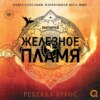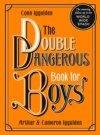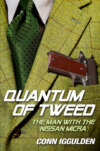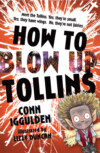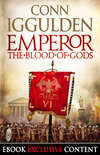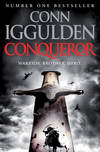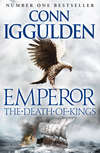Read the book: «Lords of the Bow»
THE CONQUEROR SERIES
LORDS OF THE BOW
CONN IGGULDEN

Copyright
This novel is entirely a work of fiction. The names, characters and incidents portrayed in it are the work of the author's imagination. Any resemblance to actual persons, living or dead, events or localities is entirely coincidental.
HarperCollinsPublishers Ltd. 1 London Bridge Street London SE1 9GF
First published in Great Britain by HarperCollinsPublishers 2008
Copyright © Conn Iggulden 2008
Con Iggulden asserts the moral right to be identified as the author of this work
A catalogue copy of this book is available from the British Library
All rights reserved under International and Pan-American Copyright Conventions. By payment of the required fees, you have been granted the non-exclusive, non-transferable right to access and read the text of this ebook on-screen. No part of this text may be reproduced, transmitted, down-loaded, decompiled, reverse engineered, or stored in or introduced into any information storage and retrieval system, in any form or by any means, whether electronic or mechanical, now known or hereinafter invented, without the express written permission of HarperCollins ebooks
This book is sold subject to the condition that it shall not, by way of trade or otherwise, be lent, re-sold, hired out or otherwise circulated without the publisher's prior consent in any form of binding or cover other than that in which it is published and without a similar condition including this condition being imposed on the subsequent purchaser
HarperCollinsPublishers has made every reasonable effort to ensure that any picture content and written content in this ebook has been included or removed in accordance with the contractual and technological constraints in operation at the time of publication
Source ISBN: 9780007201778
Ebook Edition © FEBRUARY 2009 ISBN: 9780007285358
Version: 2016-10-10
Dedication
To my daughter, Sophie
Map


Contents
Title Page Copyright Dedication Map Part One Prologue Chapter One Chapter Two Chapter Three Chapter Four Chapter Five Chapter Six Chapter Seven Chapter Eight Chapter Nine Chapter Ten Chapter Eleven Chapter Twelve Chapter Thirteen Chapter Fourteen Chapter Fifteen Part Two Chapter Sixteen Chapter Seventeen Chapter Eighteen Chapter Nineteen Chapter Twenty Chapter Twenty-One Chapter Twenty-Two Chapter Twenty-Three Chapterr Twenty-Four Chapter Twenty-Five Chapter Twenty-Six Chapter Twenty-Seven Chapter Twenty-Eight Chapter Twenty-Nine Chapter Thirty Chapter Thirty-One Chapter Thirty-Two Historical Note Sample Prologue Chapter One Chapter Two Chapter Three Chapter Four Chapter Five Keep Reading About the Author Also By Conn Iggulden About the Publisher
PART ONE

‘Behold, a people shall come from the north, and a great nation. They shall hold the bow and the lance; they are cruel and will not show mercy; their voice shall roar like the sea, and they shall ride upon horses, every one put in array, like a man to the battle.’
– Jeremiah 50:41, 42
PROLOGUE

The khan of the Naimans was old. He shivered in the wind as it blew over the hill. Far below, the army he had gathered made its stand against the man who called himself Genghis. More than a dozen tribes stood with the Naimans in the foothills as the enemy struck in waves. The khan could hear yelling and screams on the clear mountain air, but he was almost blind and could not see the battle.
‘Tell me what is happening,’ he murmured again to his shaman.
Kokchu had yet to see his thirtieth year and his eyes were sharp, though shadows of regret played over them.
‘The Jajirat have laid down their bows and swords, my lord. They have lost their courage, as you said they might.’
‘They give him too much honour with their fear,’ the khan said, drawing his deel close around his scrawny frame. ‘Tell me of my own Naimans: do they still fight?’
Kokchu did not respond for a long time as he watched the roiling mass of men and horses below. Genghis had caught them all by surprise, appearing out of the grasslands at dawn when the best scouts said he was still hundreds of miles away. They had struck the Naiman alliance with all the ferocity of men used to victory, but there had been a chance to break their charge. Kokchu silently cursed the Jajirat tribe, who had brought so many men from the mountains that he had thought they might even win against their enemies. For a little time, their alliance had been a grand thing, impossible even a few years before. It had lasted as long as the first charge and then fear had shattered it and the Jajirat had stepped aside.
As Kokchu watched, he swore under his breath, seeing how some of the men his khan had welcomed even fought against their brothers. They had the mind of a pack of dogs, turning with the wind as it blew strongest.
‘They fight yet, my lord,’ he said at last. ‘They have stood against the charge and their arrows sting the men of Genghis, hurting them.’
The khan of the Naimans brought his bony hands together, the knuckles white.
‘That is good, Kokchu, but I should go back down to them, to give them heart.’
The shaman turned a feverish gaze on the man he had served all his adult life.
‘You will die if you do, my lord. I have seen it. Your bondsmen will hold this hill against even the souls of the dead.’ He hid his shame. The khan had trusted his counsel, but when Kokchu watched the first Naiman lines crumple, he had seen his own death coming on the singing shafts. All he had wanted then was to get away.
The khan sighed. ‘You have served me well, Kokchu. I have been grateful. Now tell me again what you see.’
Kokchu took a quick, sharp breath before replying.
‘The brothers of Genghis have joined the battle now. One of them has led a charge into the flanks of our warriors. It is cutting deeply into their ranks.’ He paused, biting his lip. Like a buzzing fly, he saw an arrow darting up towards them and watched it sink to its feathers in the ground just a few feet below where they crouched.
‘We must move higher, my lord,’ he said, rising to his feet without looking away from the seething mass of killing far below.
The old khan rose with him, aided by two warriors. They were cold-faced as they witnessed the destruction of their friends and brothers, but they turned up the hill at Kokchu’s gesture, helping the old man to climb.
‘Have we struck back, Kokchu?’ he asked, his voice quavering. Kokchu turned and winced at what he saw. Arrows hung in the air below, seeming to move with oily slowness. The Naiman force had been split in two by the charge. The armour Genghis had copied from the Chin was better than the boiled leather the Naimans used. Each man wore hundreds of finger-width lengths of iron sewn onto thick canvas over a silk tunic. Even then, it could not stop a solid hit, though the silk often trapped the arrowhead. Kokchu saw the warriors of Genghis weather the storm of shafts. The horsetail standard of the Merkit tribe was trampled underfoot and they too threw down their weapons to kneel, chests heaving. Only the Oirat and Naimans fought on, raging, knowing they could not hold for long. The great alliance had come together to resist a single enemy and with its end went all hope of freedom. Kokchu frowned to himself, considering his future.
‘The men fight with pride, my lord. They will not run from these, not while you are watching.’ He saw a hundred warriors of Genghis had reached the foot of the hill and were staring balefully up at the lines of bondsmen. The wind was cruelly cold at such a height and Kokchu felt despair and anger. He had come too far to fail on a dry hill with the cold sun on his face. All the secrets he had won from his father, surpassed even, would be wasted in a blow from a sword, or an arrow, to end his life. For a moment, he hated the old khan who had tried to resist the new force on the plains. He had failed and that made him a fool, no matter how strong he had once seemed. In silence, Kokchu cursed the bad luck that still stalked him.
The khan of the Naimans was panting as they climbed and he waved a weary hand at the men who held his arms.
‘I must rest here,’ he said, shaking his head.
‘My lord, they are too close,’ Kokchu replied. The bondsmen ignored the shaman, easing their khan down to where he could sit on a ledge of grass.
‘Then we have lost?’ the khan said. ‘How else could the dogs of Genghis have reached this hill, if not over Naiman dead?’
Kokchu did not meet the eyes of the bondsmen. They knew the truth as well as he, but no one wanted to say the words and break the last hope of an old man. Below, the ground was marked in curves and strokes of dead men, like a bloody script on the grass. The Oirat had fought bravely and well, but they too had broken at the last. The army of Genghis moved fluidly, taking advantage of every weakness in the lines. Kokchu could see groups of tens and hundreds race across the battlefield, their officers communicating with bewildering speed. Only the great courage of the Naiman warriors remained to hold back the storm and it would not be enough. Kokchu knew a moment’s hope when the warriors retook the foot of the hill, but it was a small number of exhausted men and they were swept away in the next great charge against them.
‘Your bondsmen still stand ready to die for you, my lord,’ Kokchu murmured. It was all he could say. The rest of the army that had stood so bright and strong the night before lay shattered. He could hear the cries of dying men.
The khan nodded, closing his eyes.
‘I thought we might win this day,’ he said, his voice little more than a whisper. ‘If it is over, tell my sons to lay down their swords. I will not have them die for nothing.’
The khan’s sons had been killed as the army of Genghis roared over them. The two bondsmen stared at Kokchu as they heard the order, their grief and anger hidden from view. The older man drew his sword and checked the edge, the veins in his face and neck showing clearly, like delicate threads under the skin.
‘I will take word to your sons, lord, if you will let me go.’
The khan raised his head.
‘Tell them to live, Murakh, that they might see where this Genghis takes us all.’
There were tears in Murakh’s eyes and he wiped them away angrily as he faced the other bondsman, ignoring Kokchu as if he were not there.
‘Protect the khan, my son,’ he said softly. The younger man bowed his head and Murakh placed a hand on his shoulder, leaning forward to touch foreheads for a moment. Without a glance at the shaman who had brought them to the hill, Murakh strode down the slope.
The khan sighed, his mind full of clouds.
‘Tell them to let the conqueror through,’ he whispered. Kokchu watched as a bead of sweat hung on his nose and quivered there. ‘Perhaps he will be merciful with my sons once he has killed me.’
Far below, Kokchu saw the bondsman Murakh reach the last knot of defenders. They stood taller in his presence; exhausted, broken men who nonetheless raised their heads and tried not to show they had been afraid. Kokchu heard them calling farewell to one another as they walked with a light step towards the enemy.
At the foot of the hill, Kokchu saw Genghis himself come through the mass of warriors, his armour marbled in blood. Kokchu felt the man’s gaze pass over him. He shivered and touched the hilt of his knife. Would Genghis spare a shaman who had drawn it across his own khan’s throat? The old man sat with his head bowed, his neck painfully thin. Perhaps such a murder would win Kokchu’s life for him and, at that moment, he was desperately afraid of death.
Genghis stared up without moving for a long time and Kokchu let his hand fall. He did not know this cold warrior who came from nowhere with the dawn sun. Kokchu sat at the side of his khan and watched the last of the Naimans go down to die. He chanted an old protective charm his father had taught him, to turn enemies to his side. It seemed to ease the tension in the old khan to hear the tumbling words.
Murakh had been first warrior to the Naimans and had not fought that day. With an ululating yell, he tore into the lines of Genghis’ men without a thought for his defence. The last of the Naimans shouted in his wake, their weariness vanishing. Their arrows sent the men of Genghis spinning, though they rose quickly and snapped the shafts, showing their teeth as they came on. As Murakh killed the first who stood against him, a dozen more pressed him on all sides, making his ribs run red with their blows.
Kokchu continued the chant, his eyes widening as Genghis blew a horn and his men pulled back from the panting Naiman survivors.
Murakh still lived, standing dazed. Kokchu could see Genghis call to him, but he could not hear the words. Murakh shook his head and spat blood on the ground as he raised his sword once more. There were only a few Naimans who still stood and they were all wounded, their blood running down their legs. They too raised their blades, staggering as they did so.
‘You have fought well,’ Genghis shouted. ‘Surrender to me and I will welcome you at my fires. I will give you honour.’
Murakh grinned at him through red teeth.
‘I spit on Wolf honour,’ he said.
Genghis sat very still on his pony before finally shrugging and dropping his arm once more. The line surged forward and Murakh and the others were engulfed in the press of stamping, stabbing men.
High on the hill, Kokchu rose to his feet, his chant dying in his throat as Genghis dismounted and began to climb. The battle was over. The dead lay in their hundreds, but thousands more had surrendered. Kokchu did not care what happened to them.
‘He is coming,’ Kokchu said softly, peering down the hill. His stomach cramped and the muscles in his legs shuddered like a horse beset with flies. The man who had brought the tribes of the plains under his banners was walking purposefully upwards, his face without expression. Kokchu could see his armour was battered and more than a few of its metal scales hung by threads. The fight had been hard, but Genghis climbed with his mouth shut, as if the exertion was nothing to him.
‘Have my sons survived?’ the khan whispered, breaking his stillness. He reached out and took hold of the sleeve of Kokchu’s deel.
‘They have not,’ Kokchu said with a sudden surge of bitterness. The hand fell away and the old man slumped. As Kokchu watched, the milky eyes came up once more and there was strength in the way he held himself.
‘Then let this Genghis come,’ the khan said. ‘What does he matter to me now?’
Kokchu did not respond, unable to tear his gaze from the warrior who climbed the hill. The wind was cold on his neck and he knew he was feeling it more sweetly than ever before. He had seen men faced with death; he had given it to them with the darkest rites, sending their souls spinning away. He saw his own death coming in the steady tread of that man and for a moment he almost broke and ran. It was not courage that held him there. He was a man of words and spells, more feared amongst the Naimans than his father had ever been. To run was to die with the certainty of winter coming. He heard the whisper as Murakh’s son drew his sword, but took no comfort from it. There was something awe-inspiring about the steady gait of the destroyer. Armies had not stopped him. The old khan lifted his head to watch him come, sensing the approach in the same way his sightless eyes could still seek out the sun.
Genghis paused as he reached the three men, gazing at them. He was tall and his skin shone with oil and health. His eyes were wolf-yellow and Kokchu saw no mercy in them. As Kokchu stood frozen, Genghis drew a sword still marked with drying blood. Murakh’s son took a pace forward to stand between the two khans. Genghis looked at him with a spark of irritation and the young man tensed.
‘Get down the hill, boy, if you want to live,’ Genghis said. ‘I have seen enough of my people die today.’
The young warrior shook his head without a word and Genghis sighed. With a sharp blow, he knocked the sword aside and swept his other hand across, plunging a dagger into the young man’s throat. As the life went out of Murakh’s son, he fell onto Genghis with open arms. Genghis gave a grunt as he caught the weight and heaved him away. Kokchu watched the body tumble limply down the slope.
Calmly, Genghis wiped his knife and replaced it in a sheath at his waist, his weariness suddenly evident.
‘I would have honoured the Naimans, if you had joined me,’ he said.
The old khan stared up at him, his eyes empty.
‘You have heard my answer,’ he replied, his voice strong. ‘Now send me to my sons.’
Genghis nodded. His sword came down with apparent slowness. It swept the khan’s head from his shoulders and sent it rolling down the hill. The body hardly jerked at the tug of the blade and only leaned slightly to one side. Kokchu could hear the blood spattering on the rocks as every one of his senses screamed to live. He paled as Genghis turned to him and he spoke in a desperate torrent of words.
‘You may not shed the blood of a shaman, lord. You may not. I am a man of power, one who understands power. Strike me and you will find my skin is iron. Instead, let me serve you. Let me proclaim your victory.’
‘How well did you serve the khan of the Naimans to have brought him here to die?’ Genghis replied.
‘Did I not bring him far from the battle? I saw you coming in my dreams, lord. I prepared the way for you as best I could. Are you not the future of the tribes? My voice is the voice of the spirits. I stand in water, while you stand on earth and sky. Let me serve you.’
Genghis hesitated, his sword perfectly still. The man he faced wore a dark brown deel over a grubby tunic and leggings. It was decorated with patterns of stitching, swirls of purple worn almost black with grease and dirt. The boots Kokchu wore were bound in rope, the sort a man might wear if the last owner had no more use for them.
Yet there was something in the way the eyes burned in the dark face. Genghis remembered how Eeluk of the Wolves had killed his father’s shaman. Perhaps Eeluk’s fate had been sealed on that bloody day so many years before. Kokchu watched him, waiting for the stroke that would end his life.
‘I do not need another storyteller,’ Genghis said. ‘I have three men already who claim to speak for the spirits.’
Kokchu saw the curiosity in the man’s gaze and he did not hesitate.
‘They are children, lord. Let me show you,’ he said. Without waiting for a reply, he reached inside his deel and removed a slender length of steel bound clumsily into a hilt of horn. He sensed Genghis raise his sword and Kokchu held up his free palm to stay the blow, closing his eyes.
With a wrenching effort of will, the shaman shut out the wind on his skin and the cold fear that ate at his belly. He murmured the words his father had beaten into him and felt the calm of a trance come sharper and faster than even he had expected. The spirits were with him, their caress slowing his heart. In an instant, he was somewhere else and watching.
Genghis opened his eyes wide as Kokchu touched the dagger to his own forearm, the slim blade entering the flesh. The shaman showed no sign of pain as the metal slid through him and Genghis watched, fascinated, as the tip raised the skin on the other side. The metal showed black as it poked through and Kokchu blinked slowly, almost lazily, as he pulled it out.
He watched the eyes of the young khan as the knife came free. They were fastened on the wound. Kokchu took a deep breath, feeling the trance deepen until a great coldness was in every limb.
‘Is there blood, lord?’ he whispered, knowing the answer.
Genghis frowned. He did not sheathe his sword, but stepped forward and ran a rough thumb over the oval wound in Kokchu’s arm.
‘None. It is a useful skill,’ he admitted grudgingly. ‘Can it be taught?’
Kokchu smiled, no longer afraid.
‘The spirits will not come to those they have not chosen, lord.’
Genghis nodded, stepping away. Even in the cold wind, the shaman stank like an old goat and he did not know what to make of the strange wound that did not bleed.
With a grunt, he ran his fingers along his blade and sheathed it.
‘I will give you a year of life, shaman. It is enough time to prove your worth.’
Kokchu fell to his knees, pressing his face into the ground.
‘You are the great khan, as I have foretold,’ he said, tears staining the dust on his cheeks. He felt the coldness of whispering spirits leave him then. He shrugged his sleeve forward to hide the fast-growing spot of blood.
‘I am,’ Genghis replied. He looked down the hill at the army waiting for him to return. ‘The world will hear my name.’ When he spoke again, it was so quiet that Kokchu had to strain to hear him.
‘This is not a time of death, shaman. We are one people and there will be no more battles between us. I will summon us all. Cities will fall to us, new lands will be ours to ride. Women will weep and I will be pleased to hear it.’
He looked down at the prostrate shaman, frowning.
‘You will live, shaman. I have said it. Get off your knees and walk down with me.’
At the foot of the hill, Genghis nodded to his brothers, Kachiun and Khasar. Each of them had grown in authority in the years since they had begun the gathering of tribes, but they were still young and Kachiun smiled as his brother walked amongst them.
‘Who is this?’ Khasar asked, staring at Kokchu in his ragged deel.
‘The shaman of the Naimans,’ Genghis replied.
Another man guided his pony close and dismounted, his eyes fastened on Kokchu. Arslan had once been swordsmith to the Naiman tribe and Kokchu recognised him as he approached. The man was a murderer, he remembered, forced into banishment. It was no surprise to find such as he amongst Genghis’ trusted officers.
‘I remember you,’ Arslan said. ‘Has your father died then?’
‘Years ago, oathbreaker,’ Kokchu replied, nettled by the tone. For the first time, he realised he had lost the authority he had won so painfully with the Naimans. There were few men in that tribe who would have looked on him without lowering their eyes, for fear that they would be accused of disloyalty and face his knives and fire. Kokchu met the gaze of the Naiman traitor without flinching. They would come to know him.
Genghis watched the tension between the two men with something like amusement.
‘Do not give offence, shaman. Not to the first warrior to come to my banners. There are no Naimans any longer, nor ties to tribe. I have claimed them all.’
‘I have seen it in the visions,’ Kokchu replied immediately. ‘You have been blessed by the spirits.’
Genghis’ face grew tight at the words.
‘It has been a rough blessing. The army you see around you has been won by strength and skill. If the souls of our fathers were aiding us, they were too subtle for me to see them.’
Kokchu blinked. The khan of the Naimans had been credulous and easy to lead. He realised this new man was not as open to his influence. Still, the air was sweet in his lungs. He lived and he had not expected even that an hour before.
Genghis turned to his brothers, dismissing Kokchu from his thoughts.
‘Have the new men give their oath to me this evening, as the sun sets,’ he said to Khasar. ‘Spread them amongst the others so that they begin to feel part of us, rather than beaten enemies. Do it carefully. I cannot be watching for knives at my back.’
Khasar dipped his head before turning away and striding through the warriors to where the defeated tribes still knelt.
Kokchu saw a smile of affection pass between Genghis and his younger brother Kachiun. The two men were friends and Kokchu was beginning to learn everything he could. Even the smallest detail would be useful in the years to come.
‘We have broken the alliance, Kachiun. Did I not say we would?’ Genghis said, clapping him on the back. ‘Your armoured horses came in at the perfect time.’
‘As you taught me,’ Kachiun replied, easy with the praise.
‘With the new men, this is an army to ride the plains,’ Genghis said, smiling. ‘It is time to set the path, at last.’ He thought for a moment.
‘Send out riders in every direction, Kachiun. I want the land scoured of every wanderer family and small tribe. Tell them to come to the black mountain next spring, near the Onon River. It is a flat plain that will hold all the thousands of our people. We will gather there, ready to ride.’
‘What message shall they take?’ Kachiun asked.
‘Tell them to come to me,’ he said softly. ‘Tell them Genghis calls them to a gathering. There is no one to stand against us now. They can follow me or they can spend their last days waiting for my warriors on the horizon. Tell them that.’ He looked around him with satisfaction. In seven years, he had gathered more than ten thousand men. With the survivors of the defeated allied tribes, he had almost twice that number. There was no one left on the plains who could challenge his leadership. He looked away from the sun to the east, imagining the bloated, wealthy cities of the Chin.
‘They have kept us apart for a thousand generations, Kachiun. They have ridden us until we were nothing more than savage dogs. That is the past. I have brought us together and they will be trembling. I’ll give them cause.’









